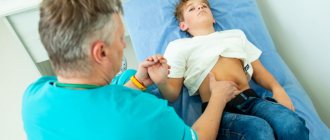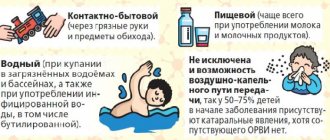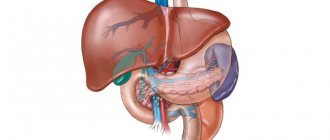The article was prepared by a specialist for informational purposes only. We urge you not to self-medicate. When the first symptoms appear, consult a doctor.
Food poisoning is an acute infectious-toxic damage to the human body that occurs due to the ingestion of low-quality food products, or poisons and chemicals.
A striking symptom of food poisoning is vomiting, which occurs a short time after ingestion of dangerous substances. Treatment is carried out either at home or in a hospital setting, which depends on the patient’s condition, his age and the cause of poisoning.
Causes and types of food poisoning
In general, there are 2 main causes of food poisoning:
- The body's reaction to foods that differ from the daily diet2.
- pathogenic flora (bacteria, fungi), viruses and toxins that enter the body mainly with contaminated food.
Every corner of the world has its own infectious agents, and they are ready to instantly attack the human gastrointestinal tract, if you just gape.
During the hot season, the chance of getting poisoned increases many times over, because food is stored less and bacteria multiply much faster. Food poisoning is especially common when traveling, so there is a separate concept - “traveler's diarrhea.” Going south, to Asia, the Middle East, Africa, South America or hot islands, we endure a sharp change in climate zone, try unusual national cuisine and drink local water. All this, combined with bacteria and viruses new to our body, can cause food poisoning.
In the US, it has been estimated that out of 1,000 people who become ill after traveling, 1/3 always suffer from diarrhea and food poisoning. E. coli is becoming the most common cause of severe diarrhea abroad1.
A child's body is even more vulnerable. For a fragile body, the cause of poisoning can be anything, especially when traveling: unwashed hands, playing in the sand, unusual sweets or fruits. An accidental sip of water from a pool or sea can also affect a child's intestinal health.
When is hospitalization necessary?
You should seek medical help as soon as possible in the following cases:
- Blood is visible in the vomit and feces.
- Body temperature rises to high levels.
- The patient develops seizures.
- CNS disorders are observed.
- The pulse becomes slow and breathing becomes heavy.
- The face, arms and legs swell.
- Muscles weaken, making it difficult for a person to hold objects or stand on their feet.
If you do not contact a specialist in time, the risk of coma is high.
Signs of food poisoning and possible complications
Despite the fact that food poisoning occurs due to various reasons, its manifestations at first are always the same, and the symptoms are similar.
The main feature of any poisoning is the speed with which it occurs. Everything happens very rapidly and quickly - within a few hours or in the next 24 hours the body signals a problem1.
The human body is a self-regulating system and therefore tries to get rid of pathogens in any way. This may include general malaise, diarrhea and abdominal pain3:
- Abdominal pain varies in nature, but is often sharp and quite severe. The intestines react to most toxins and bacteria with a spasm.
- Intoxication of the body - headache, weakness, muscle pain and joint aches.
- Diarrhea is also a striking symptom of food poisoning, manifesting itself in almost every case.
In case of severe poisoning, other symptoms may be added - nausea, vomiting and fever3:
- Nausea is one of the clearest examples of how the body tries to resist a food infection and eliminate bacteria. Nausea may be accompanied by belching and a feeling of heaviness in the stomach.
- Vomiting is another of the body’s defense mechanisms against infectious agents. In case of severe and progressive poisoning, vomiting must be controlled, otherwise severe dehydration may occur.
- Dehydration syndrome. Conditions for such a symptom would be active vomiting or diarrhea. The human body loses a huge amount of fluid in a short period of time, which can be expressed by severe thirst and dizziness, up to loss of consciousness. Dehydration is especially dangerous in children, who, with severe poisoning, instantly lose all water reserves in the body.
- Increased body temperature. The body reacts to any attack in a similar way. Food poisoning is no exception, the body tries to fight, which is manifested by an increase in temperature from 37.5º C to 40.0º C - it all depends on the specific type of virus or bacteria.
First aid for poisoning
For severe poisoning, or poisoning that occurs after eating mushrooms or canned food, you need to call an ambulance.
Symptoms that require medical attention:
- very high temperature;
- frequent diarrhea, watery stools, blood;
- signs of botulism and poisoning from poisonous mushrooms - impaired vision and coordination, difficulty swallowing, hallucinations, delirium and muscle weakness;
- a small child, a pregnant woman or an elderly person was injured.
What to do in case of poisoning:
- Gastric lavage. Give the patient water or a solution of soda, salt, potassium permanganate, and then induce vomiting. You should drink no more than half a liter of liquid at a time. Washing should be continued until there are no impurities in the vomit. Typically this requires approximately five liters of liquid;
- Taking enterosorbent - a drug that binds and removes toxins. This can be activated carbon, polysorb, filtrum or enterosgel;
- Eliminate dehydration and restore electrolyte balance. To achieve this goal, you need to drink plenty of fluids (weak tea and water at room temperature) and use special solutions (rehydron and glucosolan).
In most cases, relief occurs on the second day, and all signs disappear within three to five days. Otherwise, a therapist or gastroenterologist will be able to figure out the problem.
Treatment of food poisoning
First of all, to restore the body, you need dietary nutrition, which will help restore normal functioning of the gastrointestinal tract (GIT).
When resuming nutrition after poisoning, general recommendations must be followed3:
- You need to eat often and in small portions.
- Fried, stewed, spicy, salty and fatty foods are strictly prohibited.
- Alcohol and carbonated sweet drinks should be forgotten during treatment and further recovery.
- It is important to maintain the serving temperature of the food - it should remain neutral - neither cold nor hot.
- The predominant cooking method is boiling and steaming.
- Dishes should be light, mostly lean and familiar to the body.
A home or traveler's first aid kit should always include anti-poisoning medications.
The most popular products3,4:
- Adsorbent preparations or sorbents. No first aid kit should be without such a product. The task of the sorbent is to absorb the toxin and its further removal from the body.
- Drugs to improve digestion. They help the body fully absorb food and will be especially relevant after defeating poisoning.
- Antispasmodics or painkillers. Spasms and pain in the stomach or intestines can also be the body’s reaction to an external “attack”. The task of such medications is to relax the internal muscles and relieve spasms, as a result of which the pain goes away.
When faced with food poisoning, it is first of all important to cope with the acute period of the problem, but it is equally important to think about the period of rehabilitation of the digestive system, because the inflammatory process disrupts its normal functioning. One of the consequences of such a disorder may be a lack of digestive enzymes, which are responsible for the breakdown and absorption of food in the body. As a result, the body experiences a deficiency of nutrients, and a person, even after recovery, may still experience unpleasant symptoms for some time - discomfort in the abdomen, heaviness after eating, periodic bowel movements, etc.
Pancreatin enzyme preparations may be useful to maintain digestion after poisoning5. They are called enzymatic because they contain digestive enzymes identical to those produced by the body and are included in the standard treatment of foodborne infections6.
Digestive enzymes are a special type of compound designed to break down carbohydrates, proteins and fats for subsequent absorption in the body.
When should you see a doctor if you are vomiting?
Vomit
- in many cases, a sign that the body is experiencing serious problems and needs cleansing, and therefore, most likely, treatment. If the disease is accompanied by vomiting, this usually indicates that the disease is quite severe.
If the attack of vomiting was a one-time occurrence and there is reason to believe that it was caused by overeating, motion sickness, alcohol poisoning or stress, there is no direct need to consult a doctor. In all other cases, consultation with a doctor is necessary. Especially if attacks are repeated for two days or more, as well as in the presence of diabetes mellitus or other chronic diseases.
Sometimes vomiting requires emergency treatment. You should call an ambulance if:
- vomiting is accompanied by constant or severe abdominal pain;
- there are repeated bouts of vomiting after a head injury;
- along with vomiting, dehydration, dry mouth, and increased urination are observed;
- with deterioration of mental and functional activity in older people;
- there is blood in the vomit (for example, impurities in the form of “coffee grounds”).
What to do in case of severe alcohol intoxication with vomiting
The first thing you need to do is call a narcologist to your home.
This service can be obtained for money at a private narcology clinic. After contacting her, no one will register you.
Upon arrival to the patient, the doctor will immediately carry out the necessary therapeutic and preventive measures. But, if the patient’s condition causes concern, he will be taken to the hospital. It is very important that the poisoned person remains conscious throughout the entire treatment.
While the doctor is on the way, it is necessary to provide first aid to the person. To do this you should:
- Lay him on his left side.
This simple technique will prevent vomit from entering the respiratory tract. - Unfasten the top buttons of your clothes and open the window.
Then it will become easier for the addict to breathe. - In case of fainting, place a cotton ball soaked in ammonia to the drinker’s nose.
After inhaling ammonia vapors, he will come to his senses. - Perform gastric lavage.
This measure can only be used when treating people who are conscious and behaving adequately. A good solution for washing is a weak (caustic pink) solution of potassium permanganate. It must be drunk in an amount of at least one liter, and then pressed with your fingers on the root of the tongue. Some people think that the rich pink shade of the composition is more effective. This is wrong. If the concentration of potassium permanganate is high, a burn will occur to the mucous membranes of the pharynx, stomach, and intestines. - Apply cold to the occipital area.
Thanks to this, the gag reflex becomes less pronounced. It is clear that not every apartment has ice, so you need to improvise. Anything frozen or foods taken out of the refrigerator can be used as a compress.
Despite the simplicity of the methods listed, they are effective. Therefore, there is no need to forget about them.
It happens that the volume of alcohol taken is so high that a person loses consciousness. His heart stops. There is no need to despair. You should immediately begin chest compressions and artificial respiration. If resuscitation measures are not carried out, the poisoned person will die without waiting for the drug treatment ambulance.
Diet after child poisoning
After poisoning, children should not be given bean dishes, pearl barley porridge, pasta, pork dishes, baked goods, sausage, and, of course, fast food.
Dishes for the children's table should be steamed, boiled, stewed or baked. Cooking has some features:
- fish and meat are offered to the baby in the form of a soufflé;
- soups are prepared with vegetable broths or meat broths;
- porridges - “smears” - oatmeal, rice;
- the child should eat small portions 7–8 times a day;
- It is prohibited to force feed the baby!
- during the period of poisoning, it is necessary to ensure plenty of fluids;
- It is impossible, catering to the whims of a sick child, to replace dietary dishes with chips, sweet drinks or candies.
The diet after alcohol poisoning should not overload the digestive organs with unnecessary “work.” What can an adult eat after poisoning?
Products are boiled or steamed. Fatty foods should be avoided after poisoning. In a diet, it is important not only what to feed - portion sizes are also important, as well as the frequency of meals. Nutritionists recommend split meals - up to 6-7 times a day, naturally, in small portions. This will avoid straining the liver, stomach and pancreas. Dishes should not be very cold or very hot.
What do they eat? Recommended: omelettes, casseroles, porridge, vegetable soup, broth, jelly, puree.
If your stomach hurts after poisoning, it is better to hold off on eating vegetables and fruits.
For diarrhea after poisoning, doctors recommend rice water, white crackers and weak tea. During and after poisoning, nutritionists recommend lightly salted rice porridge and yarrow infusion.
Is it possible to drink alcohol after poisoning? The main rule is complete abstinence from alcoholic beverages! In addition to diet, after alcohol poisoning it is also important to combat intoxication - the effective drug Enterosgel will help you cope with it!
Content:
- Signs indicating severe intoxication
- What to do in case of severe alcohol intoxication with vomiting
- Prohibitions to remember
- How to treat alcohol poisoning with vomiting in a narcological hospital
- What to do after overcoming alcohol poisoning with vomiting on your own
Any alcoholic drink (even with a low ethanol content) can cause acute intoxication
. Therefore, you should not drink alcohol. People who understand what ethyl alcohol does to internal organs and metabolic processes often decide to give it up forever. And this is the only right decision that can be made regarding strong drinks.
Very often, after a feast, alcohol intoxication and vomiting occur, which does not stop for a long time. It is very dangerous. Treatment of such poisoning at home is not always possible. But for fear of publicity about their problem, those who have been poisoned prefer to hush up the disease. You can't do that.
It is unacceptable to wait for your health to stabilize on its own, since the desired outcome may not occur. Everyone should know: very severe vomiting due to alcohol poisoning is an indication for receiving qualified drug treatment.
Types of intestinal infection
- Salmonellosis - caused by salmonella, enters the body along with contaminated meat and eggs. Characteristic symptoms are diarrhea, fever, pain and abdominal cramps.
- Dysentery - caused by Shigella, enters the body through unwashed hands. Affects the large intestine. Symptoms: bloody diarrhea, fever.
- Listeriosis - caused by listeria, enters the body through canned food, raw meat, and food. The symptoms are similar to those of the flu, complications are meningitis.
- Cholera - caused by Vibrio cholerae, comes from contaminated water, seafood and food. It affects the small intestine; symptoms include vomiting, diarrhea, and rapid dehydration.
- E. coli - enters the body with poorly processed foods. Symptoms are fever, acute abdominal pain, high temperature.
It may take quite a long time before a person poisoned by poor-quality food receives medical attention. During this time period, it is necessary to take emergency measures in order to free the body from the source of poisoning, to prevent the rapid spread of toxins in the gastrointestinal tract, in the blood and in the nervous system.
2.How can harmful microbes get into food?
- During meat processing. There are bacteria in the intestines of animals that humans use as food. This is normal, but sometimes bacteria also get on those parts of animals (meat) that we eat.
- Because of the water that is used to water or wash fruits and vegetables. If there are microbes in this water (most often these are microbes from animal manure and household wastewater), they can transfer to the food.
- While cooking. If items that have germs on them come into contact with food, the germs can be transferred to them. For example, if you use the same cutting board to cut vegetables and raw meat, germs can transfer to the vegetables. The same thing happens if you don’t wash your hands well after cutting meat.
Visit our Therapy page








